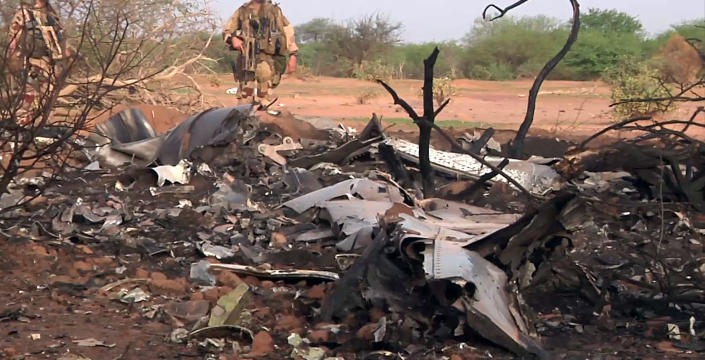‘I’ve never seen a week like this’ — aviation expert puts recent crashes in context
With four major airline tragedies on record, 2014 is quickly becoming the year of the airplane disaster, and anxiety over boarding a plane is flying high for many travelers.
Starting with missing Malaysia Airlines MH370 in March and continuing with three separate crashes in the past week — Air Algerie AH5017, the TransAsia flight in Taiwan and last week's downed flight over Ukraine — stories of airline emergencies have dominated headlines worldwide.
Yahoo News spoke with aviation expert and former FAA dispatcher William J. McGee for perspective on whether statistics suggest the skies have actually become more hazardous or if the timing of recent incidents just makes it seem that way.
“The pace of the last seven days is off the charts, no doubt,” McGee, author of "Attention All Passengers: The Truth About the Airline Industry," said.
“I don’t see any threads, quite frankly, other than they happened within days of each other,” McGee said. “It’s still too early to talk about how 2014 is going to shape up against other years.”
Including Thursday’s incident, there have been seven commercial aircraft accidents so far in 2014.
Statistically, that’s on pace with the number of accidents in 2013 and 2012. However, even with the death toll of Thursday’s crash yet to be determined, the number of commercial airline fatalities has spiked in 2014.
Airline fatalities have actually declined significantly over the past few years. An International Air Transport Association report shows that fatalities decreased from a peak of 786 in 2010 to 210 deaths in 2013. Meanwhile, the number of total accidents has remained largely stagnant over the same time period.
McGee spoke to Yahoo News on a variety of topics from the history of the MD80 aircraft series (the Air Algerie plane is an MD83), charter flight safety and whether the climate now should really inspire aerophobia.
On why it feels like plane crashes are happening all of the time now:
“While I can’t remember a week like this, the first missing Malaysian flight from March has stayed in people’s consciousness more than others,” McGee said. “The missing flight has really just spooked the whole world. A lot of it has to do with aerophobia, fear of flying. As we’re speaking, people have died on highways across the United States that we’re never going to talk about. But it doesn’t generate news coverage in the same way as this.”
On flights going off the grid/disappearing from radar:
“Aviation experts say it’s easier than you think. Clearly with the Malaysia incident it shows there are gaps in the system," McGee said.
He adds that the idea that all of the world is connected under sophisticated monitoring systems is wrong. "If people have a conception that the world is linked in a technological sense, it’s yes and no,” he said, explaining that while countries like the U.S. have cutting-edge tracking capabilities, that's not true for many parts of the world, including the region where the Air Algerie flight is suspected of crashing.
On whether the Air Algerie MD80 model is a troubled aircraft:
“At this point, barring something we don't yet know, I don't believe there is anything in the MD80 track record that raises flags. When you compare its safety record with all other commercial aircraft currently in use, it actually is one of the safest,” McGee said.
“In fact, most of the fatal accidents involving the MD80 were not attributed to the airplane itself but to other causes, such as maintenance and pilot error. Again, barring something unknown, my two cents is that I would focus on weather and other factors first before focusing on the MD80. This plane has been around a very long time and logged a lot of hours in flight.”
On charter flight safety worldwide:
While McGee doesn’t immediately see any problems with the aircraft itself, the Air Algerie flight that crashed on Thursday was a privately chartered flight, meaning it operated outside several standard aviation regulations. While there is no evidence yet that its charter status contributed to the crash, McGee says the “Wild West charter market” creates problems around the world.
“In the United States, there are two sets of rules: one for scheduled carriers and one for what they call air taxis and charters,” McGee said. “As one FAA inspector said, ‘It’s not like there are no regulations, it’s just that they are very thin.’ Among the differences are pilot qualifications, crew rest and dispatch regulations.
“It’s like flying in two different countries,” McGee added. “Overseas, the same type of thing can apply. The airline industry has a long history of looking at charters in a different way.”
On weather incidents vs. fears of terrorism:
“If today’s event turns out to be weather related, and that’s a big ‘if’ because we don’t yet know, then you would have a connection in that these last two events have been weather related. These are not new problems. These are problems that everyone from the Wright Brothers forward have been dealing with.”
On the downed Malaysia Airlines flight traveling in Ukrainian airspace and the ongoing risk of flying over regional hot spots:
“North Korea may not be in the news for a week, but it’s still a place you don’t want to fly over. And then you have to include the China Sea, Iraq, Afghanistan, Ukraine and Israel,” McGee said.
“The idea of safely flying over these hot spots is something that has to be dispelled. Even crude rocket technology has the capability of reaching high altitudes.
“The idea that you’re going to 'fly over' something doesn’t really make sense. If an emergency issue arises, the plane will have to reduce altitude. Even when flying above 30,000 feet, these planes are still at risk.”
Follow Eric Pfeiffer on Twitter (@ericpfeiffer)


